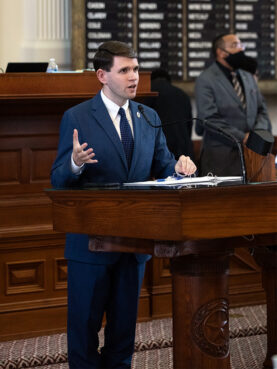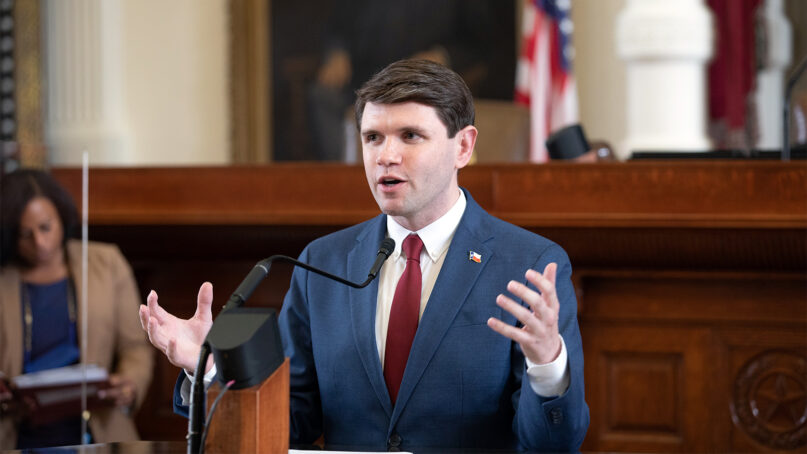(RNS) — The Texas Legislature has raised eyebrows and hackles in recent weeks as lawmakers advanced a trio of religion-related education bills championed by conservative Christian activists and lambasted by liberal critics as evidence of Christian nationalism.
The bills include one that would allow public schools to hire chaplains, another that would mandate Texas classrooms to hang a donated version of the Ten Commandments and a third that would allow schools to set aside time for staff or students to pray or read religious texts.
One prominent critic of at least two of those bills, Democratic Texas state Rep. James Talarico, is a Presbyterian seminarian, and his public, faith-infused back-and-forth with another lawmaker over the Ten Commandments bill caught fire on social media last week.
Talarico took a moment on Tuesday (May 9) to speak to Religion News Service from the floor of the Texas House of Representatives as he prepared for a vote on the chaplains bill. A few minutes after the interview concluded, he stood before the House and gave another impassioned, religion-filled speech criticizing his Republican colleagues — this time for failing to pass gun control legislation.
The interview has been edited for clarity and length.
You’ve mentioned your Christian faith a lot in recent debates over legislation in Texas. Can you say a little bit about your religious background?

Texas state Rep. James Talarico. Photo courtesy of Wikipedia/Creative Commons
I’m the grandson of a Baptist preacher from South Texas. I was born and raised in the Presbyterian Church, baptized when I was 4 years old, and I have taught Vacation Bible School. I am now a seminary student myself.
Faith is the whole reason I’m in politics. My church taught me that the two most important commandments Jesus gave us were to love God and love our neighbor. Both of those commandments, but particularly the second one, compel us to enter into the political arena. Whether it’s as elected official or an activist or an advocate or an organizer, that love we’re taught to have for our neighbors has to grow into justice. Justice is just another word for love out in public.
My faith, my church growing up, is why I became a political organizer in college. It’s why I became a public school teacher. It’s why I became a nonprofit leader. It’s why I ran for office, and why I serve here.
What compelled you to go to seminary?
The emphasis in my church growing up was “Love thy neighbor,” and the political dimension of that commandment. But after serving here in the Legislature for three terms, you know, it can be really difficult to love thy neighbor, especially as a progressive policymaker in the Texas Legislature. So, I came to believe I needed to spend an equal amount of time focused on the First Commandment, of loving God, because that first commandment sustains the second.
It can be really difficult to love thy neighbor, whether it’s fighting for marginalized neighbors here in the Capitol, or whether it’s loving my neighbors who are pushing those bills that hurt those marginalized people. Doing both of those things can lead to burnout pretty quickly. So seminary was, I think, a way for me to try to right the ship and create a better balance between those two equal commandments we were given as Christians.
The chaplains bill is expected to pass in the Texas House of Representatives later today, at which point it will be sent to the governor’s desk. Do you have any reaction to that? (The bill passed shortly after this interview.)
These things are hard for me, because I am a former teacher who, when I first got elected, introduced a package of legislation called the Whole Child Agenda. The idea behind that legislative package was that students should be treated as human beings first, and students second. We should not just focus on academics, but also tend to the physical, mental and spiritual health of our students. I do believe we have a spiritual crisis in this country — including in our schools. That is something that should be addressed by policymakers and by educators and by parents.
But this bill, especially in its current form, is not the way to do that. As it’s written in its current form, there are very few protections for students and parents. There are very few guardrails. There is no oversight. There are weak definitions of what a chaplain is, and no standards they have to meet. So I worry this bill will lead to Christian nationalists infiltrating our public schools and indoctrinating our students.
Texas Republicans are trying to force public schools to display the Ten Commandments in every classroom.
I told the bill author: “This bill is not only un-constitutional and un-American, it’s deeply un-Christian.” #txlege pic.twitter.com/TI7TmGvIKM
— James Talarico (@jamestalarico) May 3, 2023
You garnered attention recently for criticizing a proposal that would require schools to put a version of the Ten Commandments in every classroom if they are donated. You called the idea “unconstitutional and un-American, but also deeply un-Christian.” Speaking more generally, what do you find onerous about that and other religion-related bills working their way through the Legislature?
I see this as part of a troubling trend across the country of Christian nationalists attempting to take over our democracy and attempting to take over my religion — both of which I find deeply offensive. This is the culmination of 40 years of the religious right taking over our political system, and I think my fellow Christians and I have a moral obligation to speak out against this growing Christo-fascist movement.
About that: You’re a person of faith pursuing ordination, but you seem to disagree with conservative Christian activists and your own religious colleagues on pretty core issues here. What is that like for you?

Texas state Rep. James Talarico speaks on the floor of the Texas House of Representatives on Oct. 14, 2021, in Austin, Texas. Submitted photo
It’s incredibly personal, right? Because it’s not just a perversion of our Constitution, it’s a perversion of my faith. Jesus, when he was in the wilderness, was tempted by Satan with, among other things, political power— with all the kingdoms of the world. That should go to show us Christian nationalism is kind of an oxymoron. The idea that this universal faith, based on radical universal love, could be confined to one political subdivision is just contrary to the entire gospel. Furthermore, to use political power to hurt marginalized people — whether it’s folks from other faith traditions like Hindus and Buddhists and Muslims, or whether it’s to hurt LGBTQ people, or women seeking reproductive health care — (is) blasphemous, according to my reading of the New Testament.
What has the reaction been to your strident criticism of these bills — be it from constituents or, perhaps, seminary professors?
Well, my seminary professors are waiting for me to turn in a few assignments that are late, so they’re probably not thrilled about that.
But I’ve had high profile moments before. I was part of the group of lawmakers that broke quorum in 2021 and went to Washington, D.C., to protest the voter suppression bill. I usually get some passionate support and passionate criticism, as these can be polarizing moments.
But the thing about (my) Ten Commandments speech from last week is it hasn’t been that polarizing. It’s been almost universal support that I’ve heard — and not just from Democrats. I’ve had Republicans calling my legislative office and thanking me for speaking from a Christian perspective. In fact, I’ve been confused for a Republican by people who just see the clip and don’t know anything about me. I’ve had a lot of posts saying, “We’re so thankful to have Republicans standing up to this thing,” and, you know, “Glad that a Republican is finally speaking out.”
So, I guess that just goes to show how unusual it is for Democrats to be speaking about faith in that kind of way.
You mentioned Christian nationalism earlier. As a three-term legislator, has the intensity of the Christian nationalism movement in Texas increased during your tenure?
Yes, it has.
Again, I don’t want to limit it to just my three terms, because I really do think it’s the culmination of 40 years of the religious right taking over Christianity, taking over the Republican Party and now taking over our democracy. But I’ve seen just in my three terms, since 2018, it get worse and more flagrant, more arrogant, more extreme. The Ten Commandments bill, I think, is a perfect example of that. I think if you had told me the Legislature was introducing a bill to force schools to put up the Ten Commandments in every classroom, I would have thought you were telling me about an SNL (skit). We’ve become a caricature of ourselves. Some of these bills read like an Onion headline.
So yes, I think these Christian nationalists have gotten more bold, and I think they’ve been emboldened by President Trump and that movement within the Republican Party that really no longer feels constrained by the Constitution or democratic values.
(This story was was reported with support from the Stiefel Freethought Foundation.)





